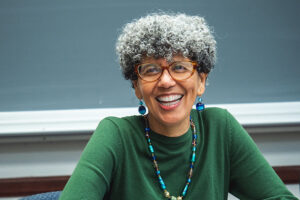 Rafia Zafar, professor of English, African and African-American Studies, and American Culture Studies, all in Arts & Sciences
Rafia Zafar, professor of English, African and African-American Studies, and American Culture Studies, all in Arts & Sciences
Morrison’s concept of rememory — the recall of things that disappear but remain — is why and how, in the class on black women writers that I regularly teach, my students learn the signal importance of Morrison to the shape not only of American literature but also to our national psyche. Semester after semester in my classrooms, young women and men encounter Morrison’s people, sometimes in “Sula,” sometimes in “Beloved,” for they remain my personal and pedagogical favorites.
Herself once a college instructor, Morrison fortunately moved from classroom teaching to instruction at a far more visceral and ground-shaking level. Whatever the novel, Morrison the teacher threads rememory throughout: in “The Bluest Eye,” two sisters imagine that an incestuously conceived pregnancy stops flowers from blooming; in “Song of Solomon,” a character’s absent navel might stand in for the severed connections of African Americans to their ancestral continent; in “Sula,” a catastrophe of dead robins announces an unsettling narrative turn.